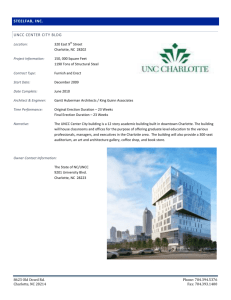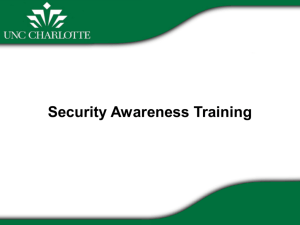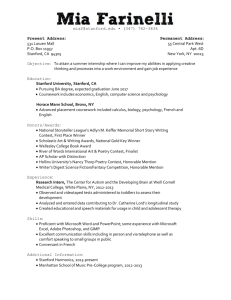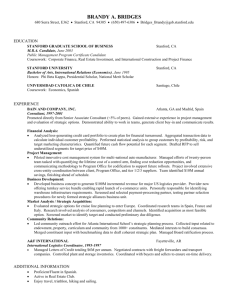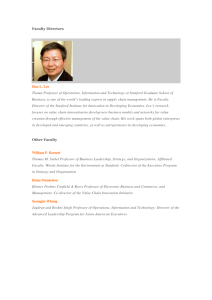EFINN 3225 – Commercial Bank Management, Fall Semester 2015
advertisement
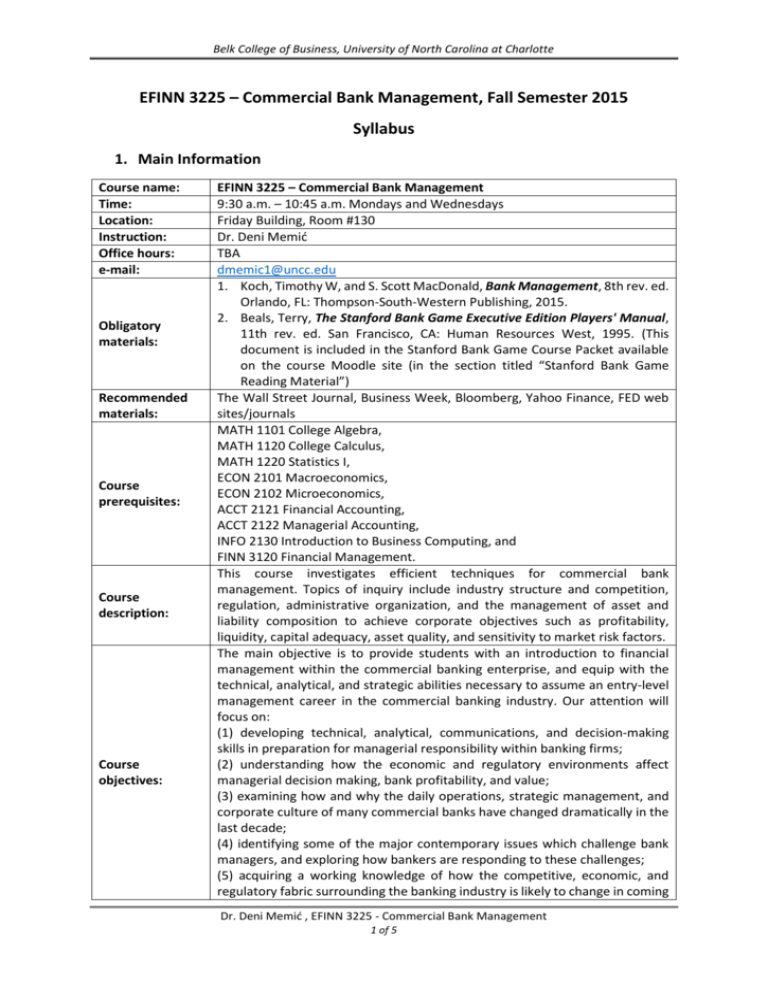
Belk College of Business, University of North Carolina at Charlotte EFINN 3225 – Commercial Bank Management, Fall Semester 2015 Syllabus 1. Main Information Course name: Time: Location: Instruction: Office hours: e-mail: Obligatory materials: Recommended materials: Course prerequisites: Course description: Course objectives: EFINN 3225 – Commercial Bank Management 9:30 a.m. – 10:45 a.m. Mondays and Wednesdays Friday Building, Room #130 Dr. Deni Memić TBA dmemic1@uncc.edu 1. Koch, Timothy W, and S. Scott MacDonald, Bank Management, 8th rev. ed. Orlando, FL: Thompson-South-Western Publishing, 2015. 2. Beals, Terry, The Stanford Bank Game Executive Edition Players' Manual, 11th rev. ed. San Francisco, CA: Human Resources West, 1995. (This document is included in the Stanford Bank Game Course Packet available on the course Moodle site (in the section titled “Stanford Bank Game Reading Material”) The Wall Street Journal, Business Week, Bloomberg, Yahoo Finance, FED web sites/journals MATH 1101 College Algebra, MATH 1120 College Calculus, MATH 1220 Statistics I, ECON 2101 Macroeconomics, ECON 2102 Microeconomics, ACCT 2121 Financial Accounting, ACCT 2122 Managerial Accounting, INFO 2130 Introduction to Business Computing, and FINN 3120 Financial Management. This course investigates efficient techniques for commercial bank management. Topics of inquiry include industry structure and competition, regulation, administrative organization, and the management of asset and liability composition to achieve corporate objectives such as profitability, liquidity, capital adequacy, asset quality, and sensitivity to market risk factors. The main objective is to provide students with an introduction to financial management within the commercial banking enterprise, and equip with the technical, analytical, and strategic abilities necessary to assume an entry-level management career in the commercial banking industry. Our attention will focus on: (1) developing technical, analytical, communications, and decision-making skills in preparation for managerial responsibility within banking firms; (2) understanding how the economic and regulatory environments affect managerial decision making, bank profitability, and value; (3) examining how and why the daily operations, strategic management, and corporate culture of many commercial banks have changed dramatically in the last decade; (4) identifying some of the major contemporary issues which challenge bank managers, and exploring how bankers are responding to these challenges; (5) acquiring a working knowledge of how the competitive, economic, and regulatory fabric surrounding the banking industry is likely to change in coming Dr. Deni Memić , EFINN 3225 - Commercial Bank Management 1 of 5 Belk College of Business, University of North Carolina at Charlotte years, and formulating effective managerial responses to these anticipated changes; (6) providing a foundation for advanced academic training and professional development in commercial bank management. Accessing course Supplemental readings are available from your password-protected Moodle resources and account at UNCC, accessible at https://moodle2.uncc.edu for all students supplemental registered in the course. The material is organized into a series of different reading material: topics, with each topic corresponding to the original source. Moodle course FINN-3225-001-Fall 2015-17737 name: 2. Important Dates # 1 2 3 4 5 6 7 8 9 Date August 24th 2015 October 5th 2015 Quizzes (4x) November 4th 2015 November 11th 2015 November 18th 2015 November 23rd 2015 December 2nd 2015 December 12th 2015 Description Semester start day Midterm exam ? Decision Input Form #1 due Decision Input Form #2 due Decision Input Form #3 due Decision Input Form #4 due Decision Input Form #5 due Final exam (9:30 – 12:00 a.m.) Table 1 – Important dates 3. Other Valuable Information 1. The dates shown below in Table 1 are subject to modest change, depending on the pace at which the class is able to cover material. This schedule, however, should serve as a guide in order to maintain an appropriate reading pace. Students are expected to read the assigned material and be prepared to discuss it prior to the date each topic is covered in class. In addition, students are expected to review on a regular basis current business events which involve financial markets and commercial banking. The optimal way to develop an awareness of current financial events is by reading the recommended materials. 2. This course is an applications-oriented course. Lectures are based on the material in the text, the assigned articles, and current events drawn from The Wall Street Journal, Business Week, Bloomberg, Yahoo Finance, FED. Exams are based on the assigned reading materials and lecture notes (including current events and Stanford Bank Game material). 3. Given the limited number of hours allocated for class meetings, class time is not sufficient to cover all of the material presented in the assigned readings. However, students are responsible for all assigned material, whether or not it is discussed in class. We will devote class time to (1) discussion of the more difficult conceptual material contained in the readings, and (2) analysis of current events. The more descriptive material contained in the course readings can be assimilated easily by students outside the classroom, and therefore, this material will be frequently discussed in class in a cursory fashion. Dr. Deni Memić , EFINN 3225 - Commercial Bank Management 2 of 5 Belk College of Business, University of North Carolina at Charlotte 4. Important University and/or College Policies 1. Academic Integrity. "All UNCC students have the responsibility to be familiar with and to observe the requirements of The UNCC Code of Student Academic Integrity (see the Catalog). This code forbids cheating, fabrication or falsification of information, multiple submission of academic work, plagiarism, abuse of academic materials (such as Library books on reserve), and complicity in academic dishonesty (helping others to violate the code). Any further specific requirements or permission regarding academic integrity in this course will be stated by the instructor, and are also binding on the students in this course. Students who violate the code can be punished to the extent of being permanently expelled from UNCC and having this fact recorded on their official transcripts. The normal penalty is zero credit on the work involving dishonesty and further substantial reduction of the course grade. In almost all cases, the course grade is reduced to "F". If you do not have a copy of the code, you can obtain one from the Dean of Students Office. Standards of academic integrity will be enforced in this course. Students are expected to report cases of academic dishonesty they become aware of to the course instructor who is responsible for dealing with them." 2. Attendance. Students are expected to attend punctually all scheduled sessions in the courses for which they are registered and are responsible for completing the work from all of the class meetings. Absences from class may be excused by the instructor for such reasons as personal illness, religious holidays, participating as an authorized University representative in an out-of-town event, or unavoidable professional responsibilities that require missing a class. Whenever possible, students are expected to seek the permission of the instructor prior to absences. 3. Disenrollment. At the discretion of the department offering a course, a student may be disenrolled from a course section if he or she does not attend the first scheduled meeting of the section. The department chair has the responsibility for providing timely notification to the student who is disenrolled. 4. Course Withdrawal. Under the UNCC Course Withdrawal Policy, students may withdraw from a course until the withdrawal deadline and the mark of "W" will be assigned. No withdrawals will be permitted after the course withdrawal deadline. It is the student's responsibility to determine by the withdrawal deadline whether to withdraw from the course or stay in for a grade. Students are expected to complete all courses for which they are registered at the close of the add/drop period. If you are concerned about your ability to succeed in this course, it is important to make an appointment to speak with me as soon as possible. Because University policy on withdrawal allows students only a limited number of opportunities available to withdraw from courses, it is important for you to understand the financial and academic consequences that may result from course withdrawal. The last day to withdraw is Tuesday, March 17th. 5. E-devices in class. The use of cell phones, smart phones, or other mobile communication devices during class time is disruptive, and is therefore prohibited during class. Except in emergencies, those using such devices must leave the classroom for the remainder of the class period. Students are permitted to use computers during class for note-taking and other class-related work. Those using computers during class for activities not related to class must leave the classroom for the remainder of the class period. 6. Diversity. The Belk College of Business strives to create an inclusive academic climate in which the dignity of all individuals is respected and maintained. Therefore, we celebrate diversity that includes, but is not limited to, ability/disability, age, culture, ethnicity, gender, language, race, religion, sexual orientation, and socioeconomic status. Dr. Deni Memić , EFINN 3225 - Commercial Bank Management 3 of 5 Belk College of Business, University of North Carolina at Charlotte 5. The Stanford Bank Game Commercial Bank Simulation Project The Stanford Bank Game represents a microcomputer-based commercial bank simulator used to train bankers since 1964. We will use this simulation program in a variety of ways as we study commercial bank management and to conduct an extended simulation exercise in which student teams of bank managers will operate a competitive community of commercial banks. A separate handout, entitled The Stanford Bank Game Version 11 Commercial Bank Management Course Packet that describes the objectives and structure of the SBG Project is available from the Moodle site. Each course examination may include question(s) derived from SBG Project material introduced in class during the normal course of the semester. 6. Examinations and Grading 6.1. Examinations Exams will cover the assigned reading materials (including the Stanford Bank Game Players' Manual), lecture notes, and current events topics discussed in class. Exam questions will include essay questions, short answer questions, and problem solving opportunities; and the final exam will include a series of extended answer and/or more lengthy problem-solving exercises. Because many questions will require arithmetic computations, you should bring a calculator on exam days. Two examinations will be given in this course: Midterm exam covering the material indicated in the course outline, and a comprehensive final exam. Midterm exam includes ten short answer and/or problem-solving questions, and students are required to complete all of the questions/problems on these midterm exams. The final exam includes (1) ten short answer and/or brief problem-solving questions, and (2) three essay and/or extended problems. While students are required to complete all of the short answer problems contained on the final exam, students need only to complete ONE of the THREE essay/extended problems provided on the final. Students who are unable to attend a scheduled examination must (1) notify the instructor in advance of the examination date that will be missed and arrange to take the exam early; or (2) present the instructor with documentation of a valid medical, family, or personal emergency to obtain permission to make-up the missed examination. In this circumstance, all make-up exams will be given on Tuesday, December 15th, at 9:30 a.m. Note that this is after the last drop day for the semester. Students who fail to make-up a missed examination, or fail to attend the scheduled final exam, will receive a score of zero for all missed work. 6.2. Grading Final course grades will be determined according to the following schedule. The total grade (course result) consists of two major groups of assignments: coursework and final exam. The coursework includes: midterm exam, 4 (four) unannounced quizzes and term projects. Midterm exam is to take place in week 7, on the October 7th (Wednesday) and will include all the material covered in class up to that week. Midterms account for 20% of the total grade. Quizzes will be give 4 times during the semester and will not be pre-announced. They will include up to 10 (ten) multiple choice/short answer questions. Each quiz is to include the chapters covered in class up to that period of time. They will be scheduled for up to 10 minutes at the end of the planned lectures. In order to achieve as many points as possible it is strongly recommended that covered materials are studied on regular basis. Quizzes account for 10% of the total grade. Dr. Deni Memić , EFINN 3225 - Commercial Bank Management 4 of 5 Belk College of Business, University of North Carolina at Charlotte Projects include student group SBG simulation results. The project assignment (SBG results) will account for 20% of the total grade. The student groups will be graded based on the results achieved with the 5 sets of decisions made on their respective banks (for reference see Table 1). Final exam is to take place in week 17, on the December 12th (Wednesday) and will include all the material covered in class. Final exam accounts for 50% of the total grade. Group Coursework Coursework Coursework Final exam Assignment Midterm exam Quizzes (4) Project Final exam TOTAL Maximum points 100 100 100 100 Weight 20% 10% 20% 50% 100% Table 2 – Grade structure The next table gives an overview of the grades system. Weighted total points 90-100 80-89 70-79 60-69 Bellow 60 Course Grade A B C D F Table 3 – Grading system (grades distribution) Dr. Deni Memić , EFINN 3225 - Commercial Bank Management 5 of 5

